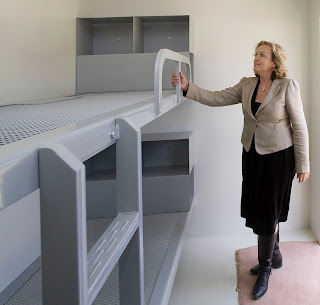Prison numbers Government's fault
This Government refuses to take responsibility for our prison population approaching 10,000 and its failures have necessitated a proposed $1 billion expenditure on increasing capacity.
The Prime Minister is claiming that crime numbers are dropping and it is an increase in the severity of crime (especially domestic violence) and tougher sentencing that is causing the problem. John Key blames recreational drugs as a major factor in crime and child poverty, this is clearly disingenuous on his part and deliberate spin to shift responsibility away from his Government. We now have levels of incarceration that place us just below Mexico and make us the 7th worst in the OECD.
The last eight years under a National led Government has seen many lost opportunities and the underfunding of systems and services that could have easily broken the cycles of crime and reduced prison numbers:
- Alcohol has a greater presence and connection to crime than any other factor and yet this Government buckled under the lobbying of the liquor industry and only implemented a fraction of the recommendations from the Law Commission.
- Drugs do have an impact on crime but a failed approach to managing cannabis and other recreational drugs means that we have many convicted of victimless drug crimes and where punishments have greater negative consequences than the drug itself.
- Poverty clearly contributes to domestic violence, especially as regards children. Given that we have growing numbers of "working poor", getting people in to work isn't necessarily the answer when so many working families can't survive on their incomes. Keeping the minimum wage well below the living wage causes many families to struggle unnecessarily and increases emotional stress.
- Rehabilitation reduces recidivism but this has been underfunded and there have been some shocking failures in prison management. A friend resigned from a Corrections rehabilitation job because of a decision to shorten a worthwhile programme to push more people through without increasing costs.
- Sentencing lobbyists have continued to influence Government policy and focussing on punishment and longer sentences just increases prison populations and makes it less likely prisoners can be rehabilitated.
- Racism is rife within our justice system and Maori make up a disproportionate percentage of prison numbers (when only 15% of total population they make up 50% of the male prison population and 60% of the females). Maori are more likely to be arrested and convicted than European New Zealanders for similar crimes and behaviours.
- Legal Aid funding has been been reduced and those on low incomes who cannot access legal representation are more likely to convicted. Former High Court and Chief District Court Judge, Sir Ron Young, has expressed concerns about the fairness of our current system.
- Education is often touted as a way of reducing criminal behaviour, but this requires funding and properly targeted support. Sadly special education support does not generally reach those who would really benefit and much of the special support ends up in high decile schools instead. The new special needs model will not deliver effective support for vulnerable children either as it will essentially remove support for those over five years.
- Private Prisons are a failed model both here (with Serco) and overseas (the US is closing them) and yet this Government refuses to abandon the idea. Private prisons need to make a profit and that means reducing spending on rehabilitation programmes and staffing.
- Counselling and addiction support services have lacked the support to make a real difference in reducing the impacts of violence and drug abuse. Relationships Aotearoa shut down because of underfunding and many addiction services have closed.
- Mental Health sufferers also end up in prison when support systems and treatments fail. Prisoners are three times more likely to need mental health services than the wider population, 60% have a personality disorder (57% of women prisoners have suffered a severe head injury and 67% of men). Police are often the first responders to deal with mental health episodes so the criminal system is being used to manage an area of health without the training or resources to do this.
- Police numbers are not keeping up with population growth and the cuts to community policing is reducing effectiveness.
- Using data to hide real crime figures enables the Government to underspend in areas that need investment. My conversations with police and the revelation of the "ghost crimes" makes it clear that data manipulation is common.
When the Government is crowing about a $1.8 budget surplus and is willing to spend $1 billion on new prison beds, I do question their economic credibility and vision. It costs around $100,000 per annum to incarcerate each prisoner and spending a small fraction of that to keep them out of prison must be cost effective. Most prisoners are not a danger to society and many of those who need to be contained to protect others may not have ended up that way with timely interventions.
Our focus on punishment rather than rehabilitation for offenders who have mental health and addiction issues means the causes of their criminal activities aren't being addressed. When we release prisoners back into the community with limited treatment and support we are not making communities safer.
I do not believe that New Zealand has a higher percentage of criminals than most other countries and in many ways our systems are needlessly creating criminals and increasing risks to our communities. There are enough examples overseas to show that different models are effective in reducing prison numbers and ensuring that reoffending is less likely to occur. The Netherlands is closing prisons and serious crime is dropping there, the fact that the opposite is happening here is because of poor management not bad luck.




Comments